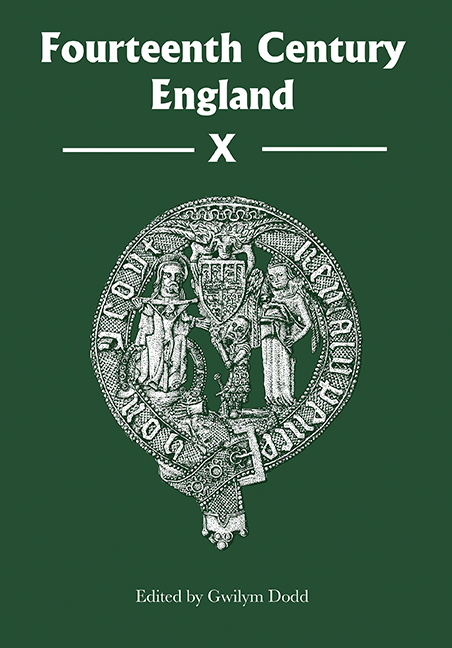Book contents
- Frontmatter
- Contents
- List of Illustrations
- Contributors
- Preface
- Abbreviations
- ‘Bought by the King Himself’: Edward II, His Chamber, His Family and His Interests in 1325–26
- Parliament in the Reign of Edward II
- The Representation of the Clergy in Parliament
- Feeding Mars: Military Purveyance in the Long Fourteenth Century
- ‘Unnatural in Body and a Villain in Soul’: Rape and Sexual Violence towards Girls under the Age of Canonical Consent in Late Medieval England
- Marriage and Inheritance: The Element of Chance in the Development of Lay Estates in the Fourteenth Century
- Mary Percy and John de Southeray: Wardship, Marriage and Divorce in Fourteenth-Century England
- Richard II's Kingship at St Stephen's Chapel, Westminster, 1377–99
- Bodies in Constant Motion: The Burials and Reburials of the Plantagenet Dynasty, c. 1272–1399
- Fourteenth Century England Issn 1471–3020
‘Unnatural in Body and a Villain in Soul’: Rape and Sexual Violence towards Girls under the Age of Canonical Consent in Late Medieval England
Published online by Cambridge University Press: 03 July 2019
- Frontmatter
- Contents
- List of Illustrations
- Contributors
- Preface
- Abbreviations
- ‘Bought by the King Himself’: Edward II, His Chamber, His Family and His Interests in 1325–26
- Parliament in the Reign of Edward II
- The Representation of the Clergy in Parliament
- Feeding Mars: Military Purveyance in the Long Fourteenth Century
- ‘Unnatural in Body and a Villain in Soul’: Rape and Sexual Violence towards Girls under the Age of Canonical Consent in Late Medieval England
- Marriage and Inheritance: The Element of Chance in the Development of Lay Estates in the Fourteenth Century
- Mary Percy and John de Southeray: Wardship, Marriage and Divorce in Fourteenth-Century England
- Richard II's Kingship at St Stephen's Chapel, Westminster, 1377–99
- Bodies in Constant Motion: The Burials and Reburials of the Plantagenet Dynasty, c. 1272–1399
- Fourteenth Century England Issn 1471–3020
Summary
Heard amongst the jury presentments and indictments made at Lincoln before the local justices of oyer and terminer in 1355 was the tragic case of Agnes, daughter of John de Cloworth, aged eight, who it was said was raped by Hugh de Outhorp, local bailiff's sergeant, in the same city almost a decade previously. According to the jury, on an undetermined date between Michaelmas 1345 and Michaelmas 1346, Hugh entered into the chamber of Agnes at night where, upon waking her, he ‘tried to contaminate and deflower her’ (eam contaminare et deflorare conavit). Due to her youth and immaturity (minoritatem et teneritatem), however, Hugh could not penetrate her, so he ‘cruelly cut her with a knife, and wounded her, and having cut her open in this way … violated and ravished her against her will and against the peace so that it was despaired of the life of the said Agnes’. Afterwards (postmodum) – the length of time is not specified – Agnes's mother, Johanna, carried her to the guildhall and raising the hue and cry presented her, ‘contaminated, ravished and wounded in this way as if she were some horrible monster’ (contaminatam defloratam et vulneratam et quasi quoddam orribile monstrum), to the incumbent mayor, Robert de Chesterfeld, and the city's two acting bailiffs, John de Bryggeforth and, most significantly of all, John de Outhorp, brother of the accused.
Upon hearing the account of Johanna and viewing firsthand the injured body of Agnes, the mayor ordered the bailiffs to arrest Hugh, confiscate his mace (clavam suam) and commit him to prison. This John de Outhorp refused to do, asserting ‘openly and publicly before the mayor in full court that he wished to maintain and warrant the aforesaid Hugh, his brother, in his office against the aforesaid woman and against all men’ before handing ‘back his mace to the same Hugh’. Moreover, wishing not to ‘hear the claims and pleadings of the aforesaid Agnes, [he] … refused to do justice to her in this matter, and … chased the same Agnes and her mother from the same hall and put them in very great (maximam) fear’.
- Type
- Chapter
- Information
- Fourteenth Century England , pp. 89 - 112Publisher: Boydell & BrewerPrint publication year: 2018
- 1
- Cited by

